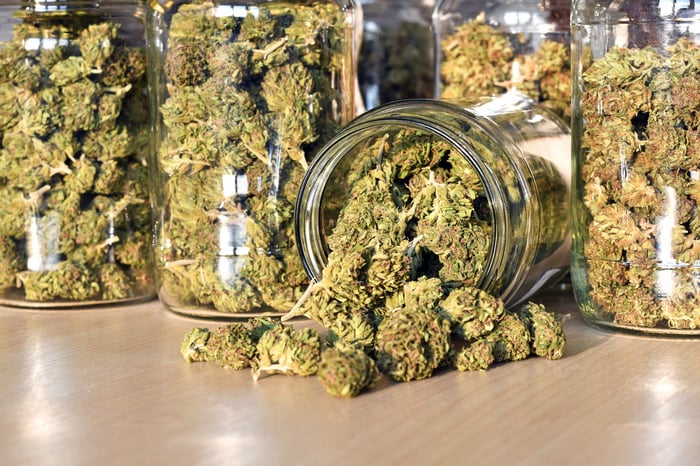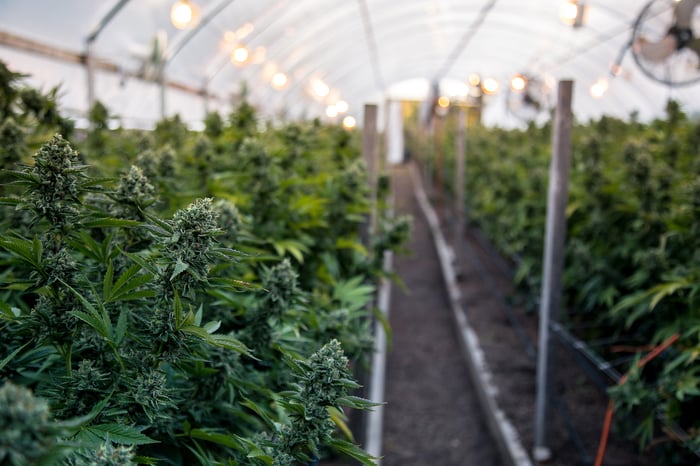Cross off yet another "marijuana first" for 2018. So far this year we've witnessed:
- Two over-the-counter-listed pot stocks -- Canopy Growth Corporation and Cronos Group -- uplist to more reputable exchanges in the U.S.
- Canada become the first industrialized country in the world to legalize recreational weed.
- Vermont become the first state to OK adult-use cannabis entirely through the legislative process.
- The largest marijuana deal in history, with Aurora Cannabis offering to acquire Ontario-based MedReleaf for $2.5 billion in stock.
- The traditionally conservative state of Oklahoma approve medical marijuana.
- The largest U.S.-based marijuana stock debut in Canada, with MedMen Enterprises securing a $1.6 billion valuation following its initial public offering (IPO).
And now, we've witnessed the very first Canadian IPO on a reputable U.S. exchange.

Image source: Getty Images.
Last Thursday, July 19, Tilray (TLRY) priced 9 million shares of its class 2 common stock at $17 a share, raising $153 million in gross proceeds. Of course, this has been just the beginning. Since Tilray's debut, shares have rocketed higher by 75% over a span of two days, pushing the company to a valuation of more than $2 billion.
But the biggest news for Tilray is what it's now going to be able to do on the expansion front. You see, going public is a considerably easier method of raising capital than meeting with private investors and investment groups day in and day out, looking for capital. The gross proceeds Tilray raised, along with the $12.1 million in cash and cash equivalents it had on hand as of March 31, 2018, according to its S-1 filing with the Securities and Exchange Commission (SEC), form a solid foundation of capital with which to expand its production capacity, invest in new growing or processing technology, enrich its distribution network, and advance its scientific research.
Tilray is on track to become a major cannabis player
Shortly, Tilray looks poised to join Canada's major players in terms of annual cannabis-equivalent production.

Image source: Getty Images.
What makes a grower a major player? While being completely arbitrary here, I'm drawing the line in the sand at 100,000 kilograms or more of peak annual production. At the moment, nine Canadian marijuana growers are expected to exceed that total based either on their own production estimates or my own estimates.
- Canopy Growth Corporation: approximately 500,000 kilograms (kg)
- Aurora Cannabis: 430,000 kg
- Aphria: 255,000 kg
- The Green Organic Dutchman: 195,000 kg
- MedReleaf: 140,000 kg
- OrganiGram Holdings: 113,000 kg
- Hydropothecary Corporation: 108,000 kg
- Emerald Health Therapeutics: 100,000-plus kg
- CannTrust Holdings: 100,000-plus kg
So where does Tilray fall? Like Canopy Growth and (partially) Emerald Health Therapeutics, the company hasn't exactly mapped out its annual output for investors. It has, however, offered some pretty clear clues in its prospectus filing with the SEC.
Look for Tilray to produce over 100,000 kg annually by 2019 or 2020
In its S-1, Tilray broke down production into four separate components:
- North American Campus in Nanaimo, British Columbia
- European Union Campus in Cantanhede, Portugal
- High Park Farms in Enniskillen, Ontario
- High Park Processing Facility in London, Ontario

Image source: Getty Images.
By the end of this year, the initial development of all four facilities combined should equal 912,000 square feet. This includes 56,000 square feet at its High Park processing facility and more than 850,000 square feet of initial growing capacity split between its North American Campus (60,000 square feet), EU Campus (230,000 square feet), and High Park Farms (566,000 square feet). While it's tough to decipher what sort of yield Tilray could achieve from 854,000 square feet of growing capacity, my guess is it would be close to, but probably not over, 100,000 kg.
However, the max development for each of these properties is considerably larger than the initial development. With cash now in Tilray's pockets, High Park Farms, which will be used primarily to meet adult-use demand, and its EU Campus, which is focused on medical cannabis production, could be expanded to as much as 2.2 million square feet and 1.3 million square feet, respectively. While I'm not sold on the idea that Tilray simply will go gangbusters on capacity expansion, a push over 100,000 kg in annual production by 2019 -- or at the least, 2020 -- seems easily achievable.
Before you click the "buy" button...
There's certainly a lot for marijuana stock investors to like about Tilray. For instance, the company has diversified its product line to include oils and is devoting production at its EU facility to the European market. As a reminder, much of Europe has given the green light to medical cannabis, but most countries have nascent growing facilities. This means they're reliant on the few countries that can export marijuana, such as Canada, for their supply of dried cannabis, oils, and extracts.
Tilray also has an impressive distribution network, with exports ongoing to nine countries and two more expected to be approved shortly. Since medical cannabis demand and pricing isn't subject to the commoditization worries in the adult-use market, Tilray's focus on medical exports and cannabis alternatives should help lift its operating margins.

Image source: Getty Images.
But before you get too excited and chase this more than $2 billion valuation, keep one important thing in mind: Tilray has been losing money and will likely continue to do so in the immediate future. Despite growing sales to $20.54 million in 2017 from $12.64 million in 2016, the company's net loss decreased by only a minute amount (from $7.88 million to $7.81 million). Plus, as the company notes in its S-1 under "General Business Risks":
We intend to continue to expend significant funds to increase our growing capacity, invest in research and development and expand our marketing and sales operations to increase our registered patients and to meet the increased compliance requirements associated with our transition to and operation as a public company. As we continue to grow, we expect the aggregate amount of these expenses will also continue to grow.
This is a pretty clear warning from a newly debuted marijuana stock that profitability isn't going to be a priority for some time. Given Tilray's $2-billion-plus valuation, there's only so long investors are going to tolerate a frothy market cap without improvement in the company's bottom line. In other words, that's your cue to stick to the sidelines.





